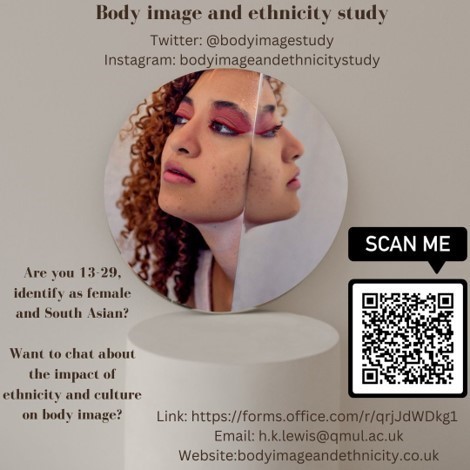Hannah Lewis is a PhD researcher at Queen Mary University of London, where she is studying eating disorder prevention strategies and how to make these more inclusive. In this blog, she reflects on the importance of breaking eating disorder stereotypes, and how her PhD project aims to make school-based interventions more culturally inclusive.

Each year, the UK’s largest eating disorders charity Beat runs an Eating Disorders Awareness Week (EDAW). These campaigns have been successful at shining a light on eating disorders, raising awareness, fundraising, and sharing stories of hope and recovery. This year they’re taking on a new challenge: to break the stereotype that eating disorders are for white girls.
When talking with members of the public about eating disorders, it’s likely that they imagine something along the lines of a white, adolescent, middle-class girls who have a restrictive eating disorder like anorexia. Sure – this group makes up a large proportion of eating disorders cases, but they do not represent all of them. It is easy to see why this is the case, however, when media coverage has endorsed a particular “face” of an eating disorder, rather than acknowledging diversity.
The reality is that eating disorders can affect absolutely anyone regardless of their gender, age, ethnicity, sexual orientation, or socioeconomic status. As you can imagine, people from different groups will have different factors influencing the onset and presentation of their disordered eating behaviours. This means that strategies to prevent eating disorders ought to be inclusive of all experiences.
As researchers, I think we need to do better to make sure that our research represents a diverse range of people and experiences. It was this way of thinking which shaped my PhD project.
Back in 2017, the Children and Young People’s Mental Health Green Paper proposed the creation of Mental Health Support Teams, who would deliver “group-based interventions engaging participants in critiquing the ‘thin ideal’, which can be effective in reducing eating disorder symptoms and body image concerns, when targeted toward high-risk adolescent girls.”
The interventions described here are cognitive-dissonance based interventions (CDBI). The most researched and developed intervention is The Body Project. With an impressive evidence-base spanning around 20 years, there is now robust proof that this type of intervention can address body dissatisfaction in young people and help to prevent the onset of eating disorders. But until recently, the overwhelming majority of participants in these trials were not representative of the diverse range of people affected by eating disorders. I began to wonder how successfully this policy proposal could be implemented in a UK content.
This year, it is encouraging to see that the Beat has chosen the theme of “men get eating disorders too”, as this is an important step in overcoming the eating disorder stereotype - one of the biggest barriers to accessing support and treatment. This shows a clear shift in thought, and perhaps this will support implementation. But even this message, designed to promote inclusivity, still excludes some groups from the conversation. Instead of “men get eating disorders too”, shouldn’t the message be “anyone can get an eating disorder”?

My PhD project seeks to tell stories of body dissatisfaction and disordered eating as experienced by the second largest demographic group in the UK, those from a South Asian background.
A big focus of this research project will be to evaluate the relevance of the current intervention content of The Body Project with this group. I’m pleased to see that there are clear recommendations emerging on how this intervention could be culturally adapted.
The most important part of this work is speaking with people from a South Asian background, hearing their experiences and insights, and collaboratively working on modifications to the current evidence-base which will be more inclusive. I’m pleased to be able to give them a voice in the conversation.
If this project sounds interesting to you, or you think it will be interesting to any young people you work with (13-29), please don’t hesitate to get in touch with h.k.lewis@qmul.ac.uk or visit the study website here.

 28 Feb 2023
28 Feb 2023